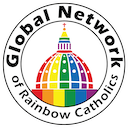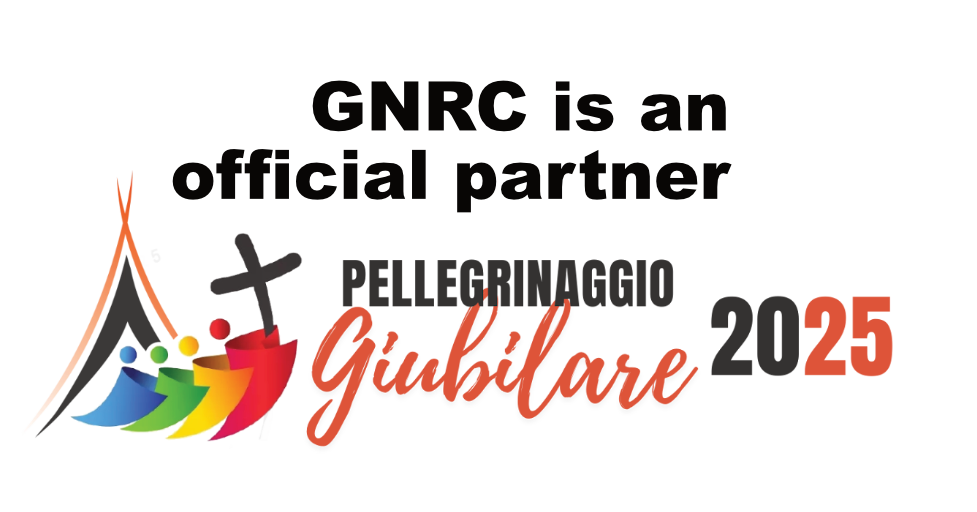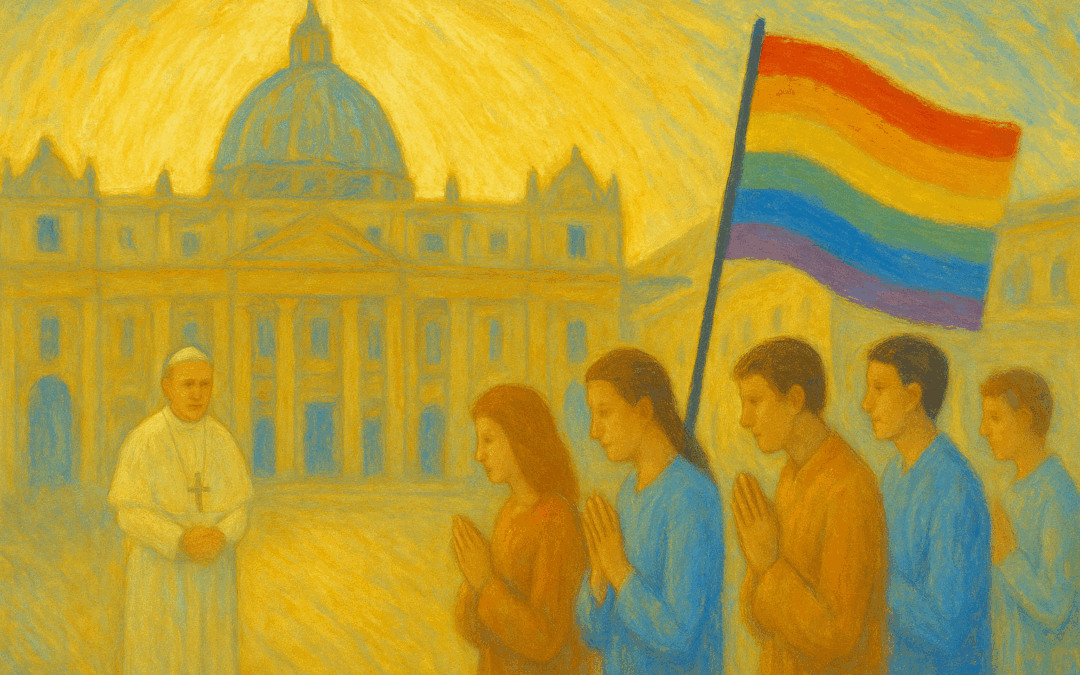The first weekend of September was an important one in the Vatican calendar, with Pope Leo XIV presiding over the canonisation ceremony of Carlo Acutis and Pier Giorgio Frassati. These two young men separated by almost a century were raised to the altars as evocative witnesses of holiness. Catholics also believe that saints, apart from being models of holiness, also act as intermediaries for the faithful in their relationship with God. Maybe less known for the large mainstay of Catholic faithful was the equally powerful celebration of a Jubilee pilgrimage for Tenda di Gionata and other organisations that was attended by pilgrims from all over the world who consider themselves Catholic and LGBTIQ+. While this event was covered by some of the world leading media, it was not the limelight for many around the world. For us, though, LGBTIQ+ Catholics, and especially for those of us, who made this pilgrimage, these few days will remain etched in our hearts.
The Jubilee pilgrimage was a historic first, bringing together laity, clergy, nuns, persons of consecrated life and over 1400 pilgrims together to thank God for our faith, and to ask for forgiveness for the failures and limits that belong to every human being. In that prayer we were recognised and welcomed as persons, as Christians, and as LGBT in our full complexity, sharing the same need for mercy as all. For many of the pilgrims though, on a more intimate level, it was an opportunity to thank God for the gift of queerness and to pray for an end to discrimination across the world. It was a celebration of our dignity as children of God, and a reminder that though we have experienced moments of rejection, of shame and embarrassment, our ‘dignity is indelible’ as Bishop Francesco Savini, President of the Italian Episcopal Conference, reminded us during the mass held at the Jesuit Chiesa di Gesu’ in the heart of Rome. ‘We are part of the Church’, another 20-year-old pilgrim from Italy, quipped. We are not just ‘invited’, but ‘the place at the table is ours already’ as Don Andrea Conocchia from the parish of Torvaianica reminded us. It evoked memories of Pope Francis’ ‘Todos! Todos! Todos!’.
A change in pastoral approach
Yet, as I reminiscence on my relationship with the Church, especially in the light of this momentous weekend, I realise that the Church, is only gradually transitioning from a role as ‘mother’ to a role as ‘sister’ and ‘sibling’ to quote one of the documents of the Maltese Diocesan Synod held back in 2005. There is of course an important change in pastoral approach especially in the last decade. Previously, LGBTIQ+ persons were only mentioned negatively as a source of shame, repugnance and condemnation. We were collectively banded as ‘objectively disordered’ and given the non-option of forced celibacy, politely branded as ‘chastity’. While the substance of the Catholic Catechism has not changed, there has been a noticeable change in pastoral attitude, allowing for more openness, warmth, care and recognition that we are beautiful children of God. From Pope Francis’ ‘Who am I to judge?’ to his ‘Andiamo Avanti’ spoken to four representatives of the Global Network of Rainbow Catholics, including myself, in October 2023, and his positive support for the trans community of Torvaianica – this prophetic positioning encouraged many other members of the Clergy and religious life to adopt a different attitude – and above all – to listen to our stories. I remember with gratitude our meetings with Cardinal Mario Grech and with Archbishop Charles Scicluna, where I felt that both of them experienced a learning curve. We were no longer some caricature or a crass image, but real people, with stories we wanted to share about ourselves, our deep faith and our deep-felt loves.
The value of intermediaries
Looking at this Jubilee in the perspective of the past decade I have spent in LGBTIQ+ pastoral outreach and ministry, I am grateful for the important role played by a number of persons who acted as intermediaries between us and the Church. At a time when it was almost unheard of for the Church hierarchy to reach out to LGBT people, there were a number of persons who helped to pave the way for us and straightened what were otherwise impossible narrow curved paths. It was a Salesian priest, then the Bishop’s Delegate for Young people who first reached out to early members of Drachma at a time when it was still a rather small invisible group, offering them the use of a church space for its meetings. It was also parents of LGBTIQ+ persons who later formed Drachma Parents Group who reached out to the Church and acted as intermediaries for us, their children. While it may sound weird, Church leaders felt more comfortable talking to parents, than to their LGBTIQ+ children. Somehow, the Church felt it did not have the right language and even was at a loss as to how to relate with us. In this sense, some of these intermediaries acted as pioneers creating a bridge and helped bring about the beginning of a commonly shared language of faith and love that opens the door to a shared seat at the table.
I was reminded of this last week when I heard that Fr James Martin SJ had been received in audience by Pope Leo. I understand that given the tumultuous effect that LGBTIQ+ issues can have on conversations within the Church, it may have been more politic and wiser to organise an encounter with the LGBTIQ+ community not directly, but through a priest who is strongly associated with LGBTIQ+ pastoral work. Through him, the Pope implicitly blessed the pastoral work being done with LGBTIQ+ persons and implicitly confirmed that the Church will continue on its more open approach as part of the Synodal journey started under Pope Francis. This may have also been the reason why the name of the Jubilee pilgrimage was not openly defined as an LGBTIQ+ pilgrimage but rather under the pseudonym Pilgrimage for Tenda di Gionata and other Associations.
The need of evocative testimonies and direct conversations
Intermediaries continue to play an important role in bringing the LGBTIQ+ community closer to the Church, especially given the strong opposition in parts of the Church to this ‘opening’. It is sobering to note the staunch conservative position of the Church in Africa supporting criminalisation of homosexuality in direct contravention of Pope Francis’ appeal and the words of the Catechism of the Church that condemns discrimination of any form. It is also regretful that there are still strong voices that link LGBTIQ+ people with child abuse and who have undermined efforts to have this reality affirmed at the Universal Synod last year. This proves beyond doubt that there is still the need for intermediaries who can straighten paths and facilitate conversations and dialogue within the Church hierarchy, while nurturing hope for the LGBTIQ+ faithful.
Notwithstanding this, I hope we can gradually start moving away from the almost complete dependence on intermediaries and from the need for pseudonyms or old jargon that refer rather inaptly to LGBTIQ+ people. For sure, intermediaries help to open doors and mediate opportunities where none may be possible on our own steam. We need some agency, and we need our voices to be heard by the hierarchy, as Pope Francis did and we hope Pope Leo does too. However, the Church needs to understand that we LGBTIQ+ persons are not children who need to be constantly chaperoned by intermediaries, as if we are not articulate enough to be witnesses to our hope and the truth we live in our own flesh. There needs to come a point where we can be called by our name and not referred to with a pseudonym or outdated term or slur. There needs to come a time when our stories are heard, and our lives can become models for other Catholic LGBTIQ+ people who will come after us. We need to celebrate our shared lives as LGBTIQ+ Catholic couples who cherish our love and live the same qualities that are required of every couple without distinction. We need to celebrate the stories of fidelity and perseverance in our experiences as LGBTIQ+ couples of faith. There needs to come a time when the Church does not feel embarrassed to call us by our name, nor be embarrassed by our experiences of deep affirming love. We need to feel, as one organiser of the pilgrimage mentioned, ‘that we are not a ghetto, but an inclusive and beautiful part of the life of the Church’. Such a conversation though needs humility from our part, and a willingness to share the road, avoiding judgment or an illusionary sense of entitlement, beyond our common calling to follow Christ. While the Church is by its nature a hierarchical communion, one hopes that a mutual spirit of discernment and accompaniment can help us grow incrementally in inclusive ways that continue to mark our common siblinghood in Christ. Indeed, this is what it means to be accompanied by the people of God as Church that is a home for all!
I could get a glimpse of this hopefulness at the various events I witnessed last weekend, including the Vigil and Mass held at the Chiesa del Gesu’ and the dinner for pilgrims held by the Global Network of Rainbow Catholics held at the Episcopalian Church of St Paul in Rome. I also witnessed life-giving testimonies at an event held at the Jesuit General Curia and hosted by the LGBTIQ+ Outreach US organisation. I saw this as we walked towards the Holy Doors of the Jubilee at St Peter’s Basilica. As one of the organisers noted ‘with surprise, the rainbow cross went through the doors with us. After decades of knocking, the door opened, and the pilgrims answered with tears of hope’. I was there too, and I experienced that sense of hope and feeling of affirmation. With hope, I continue this earthly journey humbly accompanying the Church as a son and sibling, as it encounters for itself and for its LGBTIQ+ faithful, the loving grace of God.
Chris Vella
GNRC Co-Chair and President of Drachma LGBTI+


